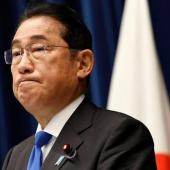Japanese Prime Minister Kishida To Step Down In September Over Financial Misconduct, Rising Living Costs
Politics tamfitronics

In a press conference on Wednesday, Kishida declared he would not seek re-election as the leader of the Liberal Democratic Party (LDP), emphasising that “politics cannot function without public trust.”
Japanese Prime Minister, Fumio Kishida, has announced he will resign in September, marking the end of a tumultuous three-year term overshadowed by political scandals.
In a press conference on Wednesday, Kishida declared he would not seek re-election as the leader of the Liberal Democratic Party (LDP), emphasising that “politics cannot function without public trust.”
Kishida’s tenure has been marred by various controversies, including allegations of financial misconduct and ineffective responses to the challenges of rising living costs.
His resignation opens the door for a new leader to tackle these pressing issues and restore confidence in the government.
“I will now focus on supporting the newly elected LDP leader as a rank-and-file member of the party,” Kishida stated, signalling his intention to aid the transition process.
The LDP is expected to elect a new leader soon, who will be tasked with addressing both the immediate economic concerns and the long-term stability of the party.
Reuters reports that the decision of Japan’s Prime Minister Fumio Kishida to resign has triggered a contest to select his successor as both the leader of the Liberal Democratic Party (LDP) and, by extension, as head of the world’s fourth-largest economy.
Kishida’s popularity has waned amid controversies surrounding the LDP’s connections with the controversial Unification Church and unrecorded political donations at party fundraising events.
Meanwhile, public dissatisfaction has grown over stagnant wages failing to keep pace with the rising cost of living, even as Japan emerges from years of deflation.
“An incumbent LDP prime minister can only run for re-election if assured of victory. It’s akin to sumo’s grand champion yokozunas; you must win gracefully,” noted Koichi Nakano, a political science professor at Sophia University.
The incoming LDP leader will face the challenge of unifying a divided ruling party and addressing the surging cost of living, rising geopolitical tensions with China, and the potential return of Donald Trump to the U.S. presidency.
Kishida, Japan’s eighth-longest-serving post-war leader, navigated the country through the COVID pandemic with substantial stimulus measures and appointed Kazuo Ueda as the head of the Bank of Japan (BOJ) to transition away from his predecessor’s aggressive monetary policies.
The BOJ’s unexpected interest rate hike in July, aimed at combating inflation, led to market instability and a significant rise in the yen.
Kishida’s resignation could lead to tighter fiscal and monetary policies depending on his successor, according to Shoki Omori, chief Japan desk strategist at Mizuho Securities in Tokyo. “In short, risk assets, particularly equities, are likely to suffer the most,” he said.
In contrast to previous administrations, Kishida prioritized policies to boost household incomes, such as wage increases and encouraging share ownership, rather than focusing solely on corporate profit-driven trickle-down economics.
Discover more from Tamfis
Subscribe to get the latest posts sent to your email.

